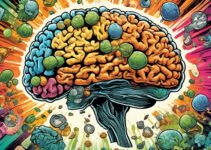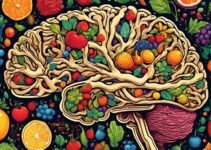Imagine a scenario where you effortlessly recall details from a conversation that took place weeks ago, or effortlessly tackle complex problems with unwavering focus. Now, consider how sustaining such mental vitality could significantly impact your life. The quest to optimize brain function and maintain cognitive sharpness is a pursuit that many find themselves drawn to, and the use of nootropic tactics has garnered attention for its potential to support brain health. But how exactly do these tactics work, and what strategies can you implement to sustain and enhance brain vitality over time?
Key Takeaways
- Nootropics enhance cognitive function and support brain health.
- Lifestyle modifications, such as healthy nutrition and regular exercise, complement the effects of nootropics.
- Omega-3 fatty acids, phosphatidylserine, acetyl-L-carnitine, and Rhodiola rosea are some of the nootropic supplements that can support long-term brain vitality.
- Cognitive training, mental exercises, and stress management techniques contribute to sustaining brain vitality.
Understanding Nootropics and Brain Health
How do nootropics impact brain health, and what are the key factors to consider when evaluating their effectiveness? Nootropic benefits are centered around enhancing cognitive function and supporting brain health. These substances have been shown to improve various aspects of brain function, including memory, focus, creativity, and mood. When evaluating the effectiveness of nootropics, it is crucial to consider factors such as the specific mechanisms of action, clinical evidence supporting their benefits, and potential side effects.
Nootropics work by modulating neurotransmitter systems, enhancing cerebral blood flow, and providing neuroprotection. These mechanisms contribute to the overall improvement in cognitive function and brain health. For instance, certain nootropics increase the production of acetylcholine, a neurotransmitter vital for learning and memory processes. Others may promote the synthesis of brain-derived neurotrophic factor (BDNF), a protein that supports the growth and maintenance of neurons.
When assessing the effectiveness of nootropics, it is essential to examine the available clinical research. Studies demonstrating their impact on cognitive performance, brain function, and overall well-being provide valuable insights into their efficacy. Additionally, considering individual differences in response to these substances is crucial. Factors such as age, genetics, and overall health can influence how a person responds to nootropics.
Lifestyle Modifications for Cognitive Enhancement
After understanding the mechanisms and impact of nootropics on brain health, it is essential to explore lifestyle modifications that can further enhance cognitive function and support overall brain vitality. Implementing the following lifestyle modifications can significantly contribute to cognitive enhancement:
- Healthy Nutrition: Consuming a diet rich in antioxidants, omega-3 fatty acids, and nutrients like vitamin E and C can support brain health. Foods such as blueberries, fatty fish, turmeric, and leafy greens contain compounds that have been shown to benefit cognitive function.
- Physical Activity: Engaging in regular physical exercise has been linked to improved cognitive function and reduced risk of cognitive decline. Aerobic exercises, in particular, have been found to stimulate the growth of new brain cells and improve overall brain performance.
- Stress Management: Chronic stress can have detrimental effects on cognitive function. Implementing stress-reducing techniques such as mindfulness meditation, yoga, or deep breathing exercises can help maintain optimal brain health.
- Quality Sleep: Adequate sleep is crucial for cognitive function and overall brain vitality. It is during sleep that the brain consolidates memories and performs essential maintenance processes. Prioritizing quality sleep can significantly impact cognitive performance and overall brain health.
Incorporating these lifestyle modifications into your daily routine can complement the effects of nootropics and contribute to sustaining brain vitality.
Nootropic Supplements for Long-Term Brain Vitality
To ensure long-term brain vitality, incorporating nootropic supplements into your daily regimen can provide targeted support for cognitive function and overall brain health. Nootropic research has identified several key supplements that may offer benefits for sustained brain vitality. One such supplement is omega-3 fatty acids, which are found in fish oil and have been linked to improved cognitive function and potential long-term brain health. Additionally, research suggests that phosphatidylserine, a phospholipid found in high concentrations in the brain, may support memory and cognitive function.
Another nootropic supplement with promising research is acetyl-L-carnitine, which has been studied for its potential to enhance neurotransmitter function and support overall cognitive health. Moreover, research on the adaptogenic herb Rhodiola rosea indicates its potential to support cognitive function and reduce mental fatigue over the long term. These nootropic supplements, when used in combination with a balanced diet rich in brain-boosting foods such as blueberries, turmeric, and broccoli, can provide comprehensive support for long-term brain vitality.
Incorporating these nootropic supplements into your daily routine, alongside brain-boosting foods, may contribute to the maintenance of cognitive function and overall brain health as you age. However, it is essential to consult with a healthcare professional before starting any new supplement regimen, especially if you have existing health conditions or are taking medications. Nootropic research continues to evolve, and staying informed about the latest findings can help you make informed decisions about supporting your long-term brain vitality.
Cognitive Training and Mental Exercises
Engage in cognitive training and mental exercises to enhance your brain's cognitive function and promote long-term mental acuity. Research suggests that engaging in specific mental exercises can lead to memory improvement and attention enhancement. Here are four evidence-based cognitive training and mental exercises you can incorporate into your daily routine to support brain vitality:
- Dual N-Back Training: This exercise involves continuously updating your working memory with the current and previous stimuli. It has been shown to enhance working memory capacity, leading to improved attention and cognitive control.
- Crossword Puzzles and Sudoku: These classic mental exercises can help maintain and improve cognitive function, including memory, attention, and problem-solving skills. Regular engagement with these puzzles can contribute to long-term brain health.
- Speed Reading: Training yourself to read faster while maintaining comprehension can improve information processing speed and working memory. This exercise can enhance attention and focus while promoting efficient cognitive processing.
- Mindfulness Meditation: This practice involves focusing your attention on the present moment. Studies have shown that regular mindfulness meditation can lead to improvements in attention, memory, and cognitive flexibility.
Incorporating these cognitive training exercises into your daily routine can contribute to sustaining and enhancing brain vitality, promoting long-term cognitive function, and supporting overall mental acuity.
Implementing Stress Management Techniques
To further fortify your cognitive well-being following cognitive training and mental exercises, it is imperative to implement effective stress management techniques that can sustain optimal brain vitality and holistic mental acuity. Mindfulness meditation is a powerful tool for reducing stress and enhancing cognitive function. Research has shown that regular practice of mindfulness meditation can lead to structural changes in the brain, including increased gray matter density in areas associated with attention, memory, and emotional regulation. By incorporating mindfulness meditation into your daily routine, you can actively reduce the impact of stress on your brain and promote overall mental well-being.
In addition to mindfulness meditation, relaxation techniques such as deep breathing, progressive muscle relaxation, and guided imagery can be valuable in managing stress. Deep breathing exercises help to calm the mind and reduce the physiological effects of stress, while progressive muscle relaxation can alleviate muscle tension and promote a sense of physical and mental relaxation. Guided imagery, on the other hand, involves visualizing peaceful and calming scenes to redirect your focus away from stressors.
Frequently Asked Questions
Can Nootropics Be Used to Treat Specific Medical Conditions Such as ADHD or Alzheimer's Disease?
Yes, nootropics can be used to treat specific medical conditions such as ADHD or Alzheimer's disease. Nootropic alternatives offer natural remedies that may help improve cognitive function and alleviate symptoms associated with these conditions. Research suggests that certain nootropics can enhance focus and attention in individuals with ADHD, while also potentially slowing cognitive decline in those with Alzheimer's disease. However, it's important to consult with a healthcare professional before using nootropics for medical conditions.
Are There Any Potential Negative Side Effects of Long-Term Use of Certain Nootropic Supplements?
Long-term use of certain nootropic supplements may pose potential risks and safety concerns. Adverse reactions such as insomnia, headaches, or gastrointestinal issues have been reported in some cases. However, these effects can vary based on individual tolerance and the specific type of nootropic used. Research on long-term effects is ongoing, and it's important to consult with a healthcare professional before starting any long-term regimen.
How Can Cognitive Training and Mental Exercises Benefit Individuals With Neurodegenerative Diseases Like Parkinson's or Multiple Sclerosis?
Cognitive rehabilitation and mental exercises can benefit individuals with neurodegenerative diseases like Parkinson's or multiple sclerosis by promoting memory enhancement and overall cognitive function. Research suggests that engaging in activities such as memory games, problem-solving tasks, and structured cognitive training can help slow down cognitive decline and improve quality of life for those affected by these conditions. These interventions are designed to target specific cognitive domains and promote neuroplasticity, potentially leading to improved cognitive function.
What Are Some Unconventional Stress Management Techniques That Can Complement the Use of Nootropic Supplements?
If you're seeking unconventional relaxation techniques to complement nootropic supplements, consider holistic stress relief strategies. Engaging in activities like forest bathing, sound therapy, or laughter yoga can offer unique ways to manage stress and enhance cognitive function. These unconventional approaches can support your overall well-being and mental acuity. When combined with nootropic supplements, they create a comprehensive approach to brain vitality and stress management.
Are There Any Potential Interactions Between Certain Lifestyle Modifications and Specific Nootropic Supplements That Should Be Considered?
When making lifestyle modifications, it's crucial to consider potential interactions with specific nootropic supplements for optimal brain health. Certain lifestyle adjustments, like changes in diet, exercise, or sleep patterns, may impact the effectiveness of nootropics. It's important to carefully assess how these modifications could influence the absorption, metabolism, or efficacy of the supplements. Understanding these interactions can help you maximize the benefits of both lifestyle changes and nootropic use.
Conclusion
In conclusion, incorporating nootropic tactics into your lifestyle can help sustain brain vitality. While some may argue that these methods are only for those with cognitive decline, research shows that nootropics and cognitive training can benefit individuals of all ages in maintaining brain health. By making simple lifestyle modifications, using nootropic supplements, and practicing cognitive exercises, you can support long-term brain vitality and cognitive function.



